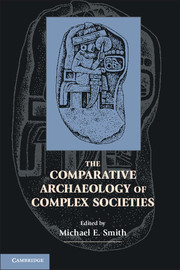Book contents
- Frontmatter
- Contents
- Tables
- Figures
- Contributors
- Foreword
- Preface
- Chapter 1 Comparative Archaeology
- Chapter 2 Approaches to Comparative Analysis in Archaeology
- Chapter 3 Comparative Frames for the Diachronic Analysis of Complex Societies
- Chapter 4 What It Takes to Get Complex
- Chapter 5 Challenges for Comparative Study of Early Complex Societies
- Chapter 6 Patterned Variation in Regional Trajectories of Community Growth
- Chapter 7 The Genesis of Monuments in Island Societies
- Chapter 8 Power and Legitimation
- Chapter 9 The Strategies of Provincials in Empires
- Chapter 10 Household Economies under the Aztec and Inka Empires
- Chapter 11 Low-Density, Agrarian-Based Urbanism
- Chapter 12 Archaeology, Early Complex Societies, and Comparative Social Science History
- Index
- References
Chapter 8 - Power and Legitimation
Political Strategies, Typology, and Cultural Evolution
Published online by Cambridge University Press: 07 October 2011
- Frontmatter
- Contents
- Tables
- Figures
- Contributors
- Foreword
- Preface
- Chapter 1 Comparative Archaeology
- Chapter 2 Approaches to Comparative Analysis in Archaeology
- Chapter 3 Comparative Frames for the Diachronic Analysis of Complex Societies
- Chapter 4 What It Takes to Get Complex
- Chapter 5 Challenges for Comparative Study of Early Complex Societies
- Chapter 6 Patterned Variation in Regional Trajectories of Community Growth
- Chapter 7 The Genesis of Monuments in Island Societies
- Chapter 8 Power and Legitimation
- Chapter 9 The Strategies of Provincials in Empires
- Chapter 10 Household Economies under the Aztec and Inka Empires
- Chapter 11 Low-Density, Agrarian-Based Urbanism
- Chapter 12 Archaeology, Early Complex Societies, and Comparative Social Science History
- Index
- References
Summary
Tell Mardikh lies on an arid plain to the east of Hamas, Syria. It is not an unlikely place for an ancient city, nor is it a particularly obvious one. It is surrounded by tillable land, and is adjacent to the Orontes River valley. It is not a particularly impressive site. It has massive walls, the ruins of which can be seen for several miles, but they are no larger than those surrounding many tell sites in northern Syria. What makes Tell Mardikh special are the more than 15,000 clay tablets discovered in situ in what appears to have been a royal archive, tablets that offer a remarkable portrait of an ancient empire (Matthiae 1981). Without the archive of tablets, Tell Mardikh is one among several Early Bronze Age city-states in northern Syria, each controlling a modest hinterland of agricultural fields and pasturage (e.g., Wilkinson 1994). With the archive, Tell Mardikh becomes the center of control for an empire that stretched across much of what is today northern Syria and Iraq and southeastern Turkey (Pettinato 1991).
Tell Mardikh illustrates an assumption that underlies the rest of this chapter: The past is more complex than the archaeological record makes it appear. This assumption is, in my opinion, a fairly uncontroversial one, and is a logical extension of what we know about the archaeological record. However, it also problematizes much of traditional thought in archaeology, for example, Yoffee’s Rule, which asserts that “if you can argue whether a society is a state or isn’t, then it isn’t” (Yoffee 2005:41).
- Type
- Chapter
- Information
- The Comparative Archaeology of Complex Societies , pp. 165 - 191Publisher: Cambridge University PressPrint publication year: 2011
References
- 1
- Cited by



